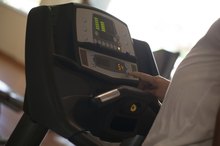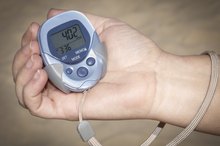The NordicTrack A2050 is a compact, folding treadmill designed for residential use only, with a maximum user load of 300 pounds 1. Although the A2050 is an older treadmill model, produced in 2004, it offers some advanced features, such as iFit technology and built-in fitness programs that control the incline and speed settings for you. You won't find the A2050 new anymore, but you may find used units for sale.
What the A2050 Can Do
The A2050 is capable of speeds up to 10 mph and an incline up to 12 percent. Use the up and down arrow buttons on the console to adjust the speed and incline manually. Like many NordicTrack treadmills, the A2050 has pulse sensors on the hand grips so you can check your heart rate during your workout. Step onto the foot rails and grab the sensors for at least 15 seconds until your heart rate displays. This unit is compatible with an optional sensor that you wear around your chest, but you must purchase this accessory separately. With the chest sensor, you don’t have to interrupt your workout to grab the handles; the chest sensor automatically relays the information to the treadmill.
- The A2050 is capable of speeds up to 10 mph and an incline up to 12 percent.
- Like many NordicTrack treadmills, the A2050 has pulse sensors on the hand grips so you can check your heart rate during your workout.
What the A2050 Has to Tell You
Proform 535X Treadmill Specs
Learn More
The console features an electronic display, a book holder, two accessory trays and a built-in fan with four running modes: low, medium, high and auto, which changes the speed of the fan as the speed of the belt changes. The electronic display provides information about your workout, including incline level, elapsed time, approximate calories burned, approximate grams of carbs burned, heart rate, speed and pace, as measured in minutes per mile. An odometer button on the console shows the total miles the walking belt has moved since the treadmill was purchased, the total miles walked since the odometer was last cleared and the distance covered during the current workout.
The A2050 as a Personal Trainer
The NordicTrack A2050 includes eight preset programs. Each program is divided into 20, 30 or 40 one-minute segments and each segment has one speed and one incline setting controlled by the treadmill. The A2050 also includes two heart rate programs. When selecting a heart rate program, first choose your maximum heart rate, which the program will not exceed. The program is divided into 20 one-minute segments, each one with a target heart rate. The treadmill adjusts the speed and incline to keep your heart rate near this target rate. You must wear the optional chest-pulse sensor to use the heart rate programs.
- The NordicTrack A2050 includes eight preset programs.
- Each program is divided into 20, 30 or 40 one-minute segments and each segment has one speed and one incline setting controlled by the treadmill.
Advanced Fitness With the A2050
Comparison of the ProForm XP550E & XP550S
Learn More
Use a stereo audio cable to connect the A2050 to your stereo, MP3 player, CD player or computer. Purchase iFit CDs or online workouts to use with your NordicTrack treadmill. iFit programs control the incline and speed settings as a personal trainer walks you through the workout and music plays in the background. You can manually override the iFit program choices by pressing the incline and speed buttons on the console.
- Use a stereo audio cable to connect the A2050 to your stereo, MP3 player, CD player or computer.
- iFit programs control the incline and speed settings as a personal trainer walks you through the workout and music plays in the background.
Related Articles
References
Writer Bio
Based in Austin, Texas, Jolie Johnson has been in the fitness industry for over 12 years and has been writing fitness-related articles since 2008 for various websites. She received her Bachelor of Arts in English and philosophy from the University of Illinois.






